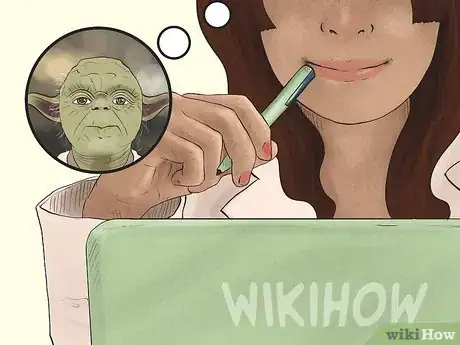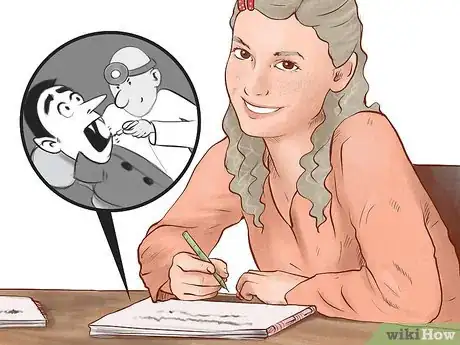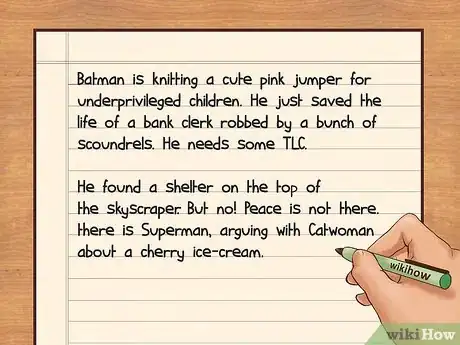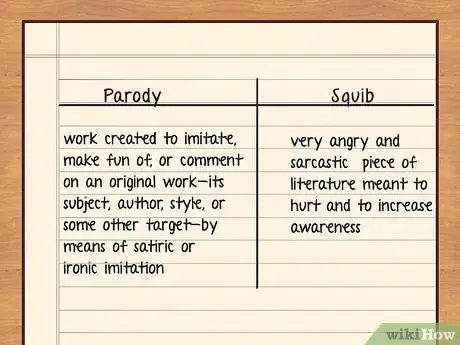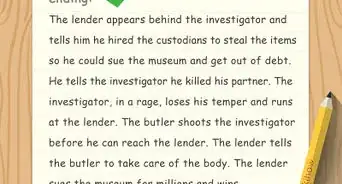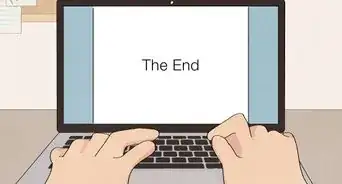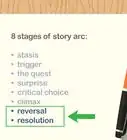X
wikiHow is a “wiki,” similar to Wikipedia, which means that many of our articles are co-written by multiple authors. To create this article, 9 people, some anonymous, worked to edit and improve it over time.
This article has been viewed 34,394 times.
Learn more...
Parodies (or spoofs) are more common in movies, but aspiring writers should try them at least once in their life. Parodies aren’t today's leading type of literature and this article isn’t meant to tell you how to publish one. It’s just a way to make your creative juice flow and, maybe, to give you access to a brand new way of writing. Sharpen your pencils and let’s get started!
Steps
Part 1
Part 1 of 3:
Finding a Topic
-
1Try to chose your topic wisely. Do not rush into a subject that you cannot handle very well or into the too controversial one. A Donald Trump parody may feel great, but you’ll probably get too personal or overly insulting. A spoof isn’t an excuse for shooting someone down; it’s a very smart, funny and witty way to put the finger where it hurts, but in an elegant manner.
- Do not err in the opposite direction either: a parody about your grandma would be very funny for you, but what about your readers? Unless you are a genius (but we’ll dismiss this prospect), there is no fun in describing the dear old lady who looks like an owl when she wears her reading glasses. Who cares? You? Well, but are you the center of the universe? Probably not.
-
2Know your subject through and through. There is no point in depicting Batman as a worshiper of the Greek gods. What the hell will you do with that? In case you are thinking of a Batman parody, it would be better to opt for something quite close to the character, like making cute needlework between two rescues of the world and selling it for a charity.Advertisement
-
3Choose a character you love. As it was already said, a parody isn’t something mean, it’s a funny way to show another side of a genre or a fictional hero. In literature, the best spoofs ever made were the creation of authors who loved the characters or the genre. J.R.R. Tolkien's Lord of the Rings was parodied in the novel Bored of the Rings and has become an institution. It’s a great source of inspiration for any beginner in the spoof arena.
- Star Warped is the parody novel retelling all six of the Star Wars films features chapters such as "Episode I: The Fans-of-Tron Menace". It also has a Yoda in lederhosen, yodeling tidbits of wisdom.
- A sappy novel parody is an excellent way to get you started. Try to read some very watery stuff from the Harlequin collection, take some notes of the typical characters, those incredibly beautiful girls supported by unlikely manly heroes. Imagine the golden boy madly in love with the mean girl of the story and the nice one making the silliest things on earth to attract his attention. You didn’t do it right if you do not laugh out loud when you reread it!
Advertisement
Part 2
Part 2 of 3:
Starting to Write
-
1Do not restrain yourself. Most beginners tend to write like they are walking on eggshells. They polish nice sentences without any meaning and seem to be afraid of putting down what they really feel. It’s quite normal but you should really let loose and write freely what you have in mind, even if it’s not very well written. You have plenty of time to edit later on.
-
2Think in details and atmosphere. At this stage of the writing process, you should feel the atmosphere. Are you writing a Stephen King parody? Are you thinking about a specific novel? Maybe you love Dracula and are thinking about this poor guy loosing his canines and being handled by a very clumsy dentist. A good writer has a sense of what’s going on in his mind and is able to see it very clearly, a little bit like a movie going through his head.
- Try to be more aware of your surrounding. Writers are experts when it comes to tiny details that nobody else has ever noticed. It makes the salt of the story. A parody is like a magnifying glass: your character has suddenly very strange quirks, but they are as funny as hell because they stay very close to the hero. For example, Frankenstein is a model for the Detroit Auto Show, Sherlock Holmes is a happy fool high on old smelly socks, Hercule Poirot is struggling with an eating disorder and James Bond has no sense of humor at all.
-
3Think outside the box. You are not restricted to household name heroes or fictional characters. You can imagine many other kind of parodies. Let’s say that you are a huge America’s Got Talent fan. Owen, Heidi, Mel and Howie, the nice four judges, aren’t probably as sleek as they look like. You could make a witty (but still kind) spoof about a memorable audition. Put yourself in their shoes and try to sense how it feels when you are condemned to watch some farting, burping or vomiting guys. Turn the show upside down, put the contestants on the judges seats and let them decide of their talent. Here, you can have some great fun, as you’re able to predict how the judges would react when they are put on the spot.
-
4Be concise but witty. Imagination, observation skills and a good knowledge of the characters aren’t enough to make a great parody. Let’s take again the Batman example: the dear fellow is knitting a cute pink jumper for underprivileged children after saving the life of a bank clerk robbed by a bunch of scoundrels. He needs some TLC and next to him, on the top of the skyscraper where he found a shelter, Superman is arguing with Catwoman about cherry ice-cream. Show that the life of a hero can be quite petty too. Do it in a smooth manner. Your style has to stay smooth, your words should flow like a river. You need to describe everything in a few sharp sentences. Endless descriptions will kill the wit of the genre and your readers won’t like it anymore.
-
5Practice. You’ll find the right pace for the story when you’ve practiced a lot of writing. One day, you will be able to write a complete and great short story in only one day. You’ll throw yourself in it like a duck in water and feel far more joy than when you were in love.
Advertisement
Part 3
Part 3 of 3:
Avoiding Common Mistakes
-
1Do not believe that your story is good because you put the word end on it. Anything you write should be read and reviewed many times. The best thing to do if you want to hone your writing skills is to to put your spoof away in a drawer and to read it again a few weeks later. It’s probably very good if it still makes you laugh.
-
2Think hard before you put up any writing material online. It’s the best way to sadden you, especially on social media, where people are often unfiltered in their response. A good writer can take feedback but it also his own comfort, admirer and critic. Such a level of confidence requires a lot of practice and curiosity. You’ll never write anything good if you aren’t able to work alone and with dedication. Writing is your haven and your own world; cherish it!
-
3Don’t limit yourself to one genre. Flexibility is the trade of smartness and many good writers didn’t publish always the same kind of books. Get educated, read some famous biographies about good writers and see why they enjoyed so many different styles of storytelling. Do not write to be famous. Writing is a pleasure, not a means for fame.
-
4Know the difference between a parody and a squib. The latter is a very angry and sarcastic piece of literature meant to hurt and to increase awareness. Squibs are very rarely novels; they are rather essays about controversial topics. Make some research before starting any kind of writing.
Advertisement
Community Q&A
-
QuestionLike Robot Chicken, what if the creators of the original subjects sue me?
 Community AnswerIt is possible, especially if you make a lot of money off of your parody. If that happens, you will have to get a lawyer.
Community AnswerIt is possible, especially if you make a lot of money off of your parody. If that happens, you will have to get a lawyer.
Advertisement
About This Article
Advertisement


